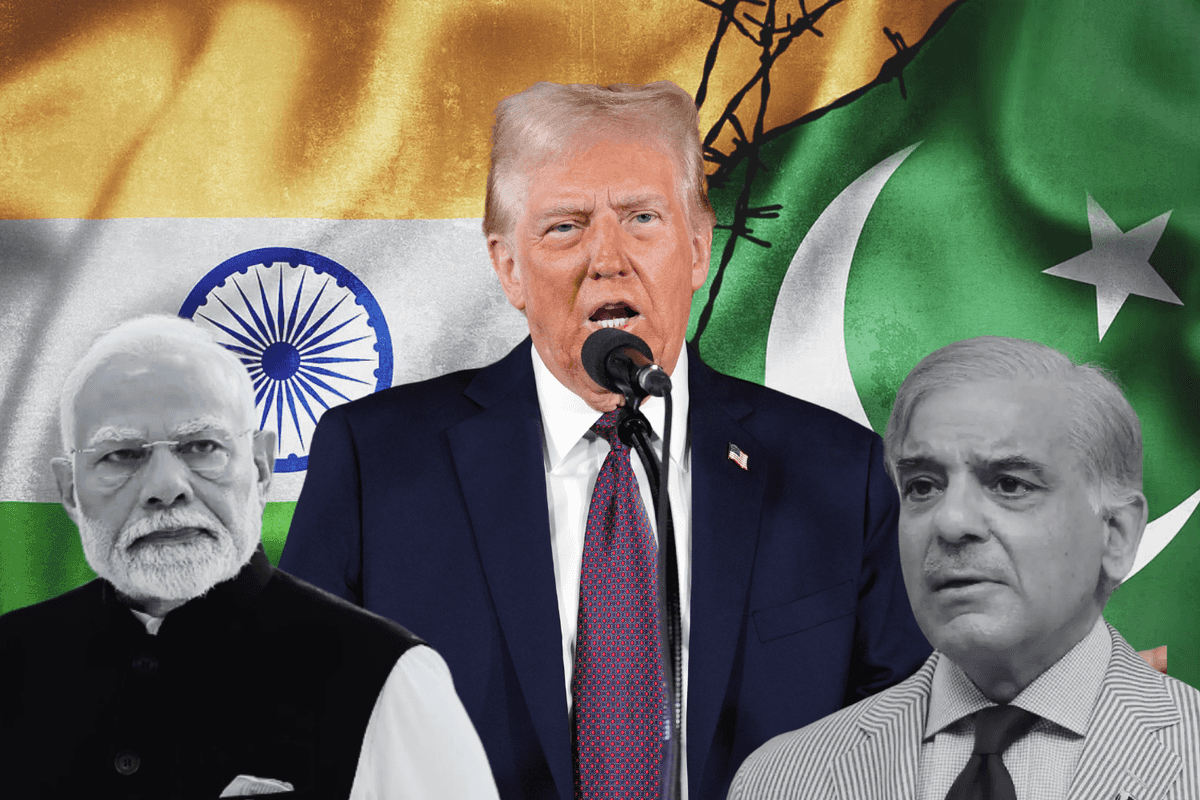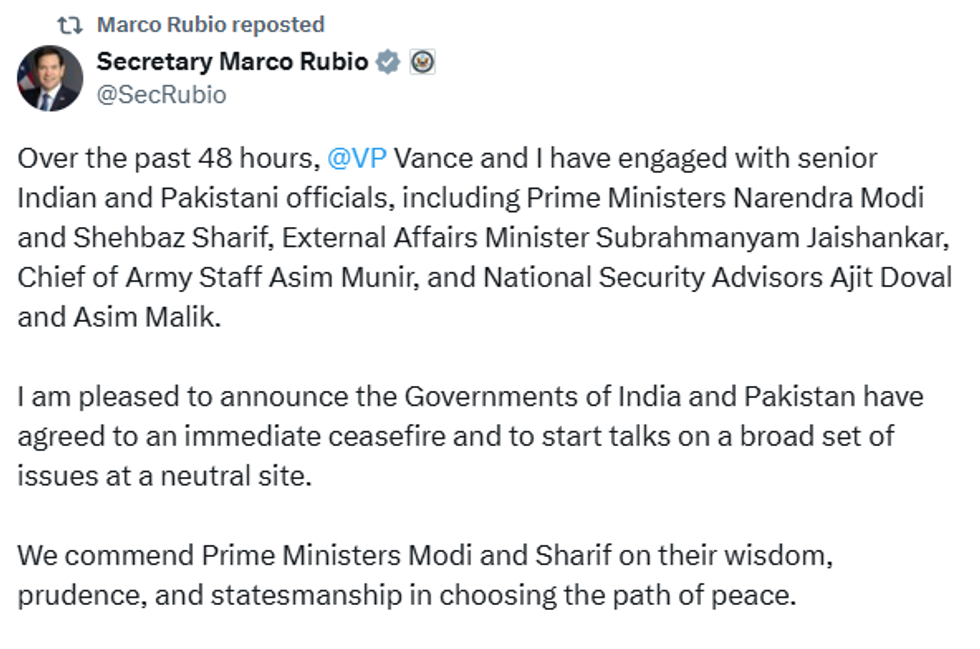News Desk
The News Desk provides timely and factual coverage of national and international events, with an emphasis on accuracy and clarity.

US President Donald Trump (C), Pakistan Prime Minister Shehbaz Sharif (R) and Indian Prime Minister Nardenra Modi (L).
Nukta
Amid rising hostilities and fears of further escalation between India and Pakistan, U.S. President Donald Trump broke the tension with a dramatic announcement on Saturday -- declaring that both the countries had agreed to a “full and immediate ceasefire,“ bringing a moment of calm to an otherwise volatile standoff.
As per reports, Pakistan and India mutually agreed to allow the U.S. president to make the ceasefire announcement.
"After a long night of talks mediated by the United States, I am pleased to announce that India and Pakistan have agreed to a FULL AND IMMEDIATE CEASEFIRE. Congratulations to both Countries on using Common Sense and Great Intelligence," he said in a post on Truth Social.
Reuters reported that India's Foreign Ministry said the head of Pakistan's military operations called his Indian counterpart on Saturday afternoon, and both sides agreed to cease all firing. The two leaders are scheduled to speak again on May 12.
The announcement came amid heightened concerns over the potential use of nuclear weapons, after Pakistan’s military signaled that its top civil-military body responsible for nuclear oversight would meet. However, the country’s defence minister later dismissed reports of any such meeting.
Despite the tense backdrop, officials from both India and Pakistan appeared to signal a readiness to de-escalate.
Meanwhile, according to Reuters, the civilian death toll on both sides of the border had risen to 66.
Shortly after the announcement, Pakistan’s Deputy Prime Minister Ishaq Dar and Indian Foreign Minister S. Jaishankar confirmed in separate posts on X that both sides had agreed to halt hostilities and suspend further military action.
Dar reiterated Pakistan’s commitment to regional peace and stability, saying that the country would never compromise on its sovereignty or territorial integrity.
Jaishankar, meanwhile, emphasized that India remains steadfast in its fight against terrorism “in all its forms and manifestations” and will continue to uphold that position.
Following the ceasefire announcement, Pakistan announced to fully reopen its airspace for all types of flights. Pakistan Airports Authority spokesperson said that all airports across the country were now available for regular flight operations. “Passengers are urged to contact their respective airlines for the most up-to-date flight schedules.”
US commends Modi, Shehbaz for ‘choosing the path of peace’
Providing further updates on the development, U.S. Secretary of State and National Security Advisor Marco Rubio said he, along with Vice President JD Vance, had engaged with senior Indian and Pakistani officials over the past 48 hours.

“I am pleased to announce that the governments of India and Pakistan have agreed to an immediate ceasefire and to start talks on a broad set of issues at a neutral site,” Rubio said in a post on X.
He commended Prime Ministers Modi and Sharif for their “wisdom, prudence, and statesmanship in choosing the path of peace.”
UAE deputy PM calls on Pakistan, India counterparts
H.H. Sheikh Abdullah bin Zayed Al Nahyan, Deputy Prime Minister and Minister of Foreign Affairs, held phone calls with Dr Subrahmanyam Jaishankar, Minister of External Affairs of the Republic of India, and Mohammad Ishaq Dar, Deputy Prime Minister and Foreign Minister of the Islamic Republic of Pakistan, and commended the wisdom of both sides to adhere to a ceasefire, which will benefit both nations and their peoples, and the South Asia region.
H.H. expressed his hope that this development will contribute to enhancing security and stability in the region.
Operation Bunyān-un-Marsūs
Pakistan launched a major counter-offensive on Saturday, codenamed Operation Bunyān-un-Marsūs, following Indian air-to-ground missile strikes on multiple Pakistani airbases -- an assault Islamabad condemned as a blatant act of aggression. The escalation prompted urgent diplomatic efforts from U.S. Secretary of State Marco Rubio to defuse tensions.
Islamabad said the strikes were in retaliation for Indian missile attacks on three key airbases, including Nur Khan near the capital, which it claimed were largely intercepted by Pakistani air defenses.
Despite the flare-up, both sides have signaled a cautious openness to de-escalation, though neither has backed down on the military front.
Indian Foreign Minister S. Jaishankar told Secretary Rubio that India’s posture “has always been measured and responsible — and remains so.” The Indian military also said it was open to de-escalation, provided Pakistan reciprocates.
“In over 26 attempted air intrusions, Pakistan inflicted damage on our equipment and personnel at airbases in Udhampur, Bhuj, Pathankot, and Bathinda,” said Indian military spokesperson Col. Sofiya Qureshi during a press briefing.
How the crisis unfolded
The latest confrontation between India and Pakistan stems from a deadly April 22 attack in Pahalgam, in Indian-administered Kashmir, where 26 Indian tourists were killed by unidentified gunmen. India held Pakistan responsible, while Islamabad denied any role and called for an independent investigation.
In response, India launched airstrikes on Wednesday (May 7), claiming it hit nine “terrorist camps” across the border. Pakistan rejected the presence of any such sites, saying the strikes killed 31 civilians.
It also claimed to have downed five Indian jets -- a claim India denied, though some damage was later independently reported.
Since then, skirmishes escalated both along the Line of Control and beyond, marking the most serious military escalation between the nuclear-armed neighbors since the 1999 Kargil conflict.
For the first time since the 1971 war, Indian airstrikes penetrated deep into Pakistan’s interior, raising fears of a broader regional conflict. The crisis came at a particularly vulnerable time for Pakistan.







Comments
See what people are discussing